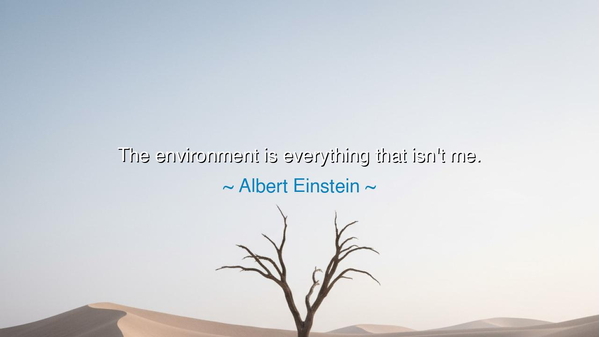
The environment is everything that isn't me.






When Albert Einstein declared, “The environment is everything that isn’t me,” he spoke not merely as a scientist but as a philosopher of existence. In these few words lies an ocean of meaning—one that reflects both humility and revelation. For Einstein, who spent his life unraveling the mysteries of space and time, the environment was not just the air we breathe or the forests we walk through—it was everything beyond the boundaries of the self. It was the infinite web of life, matter, and energy of which he was but a single thread. His statement is both an acknowledgment of human smallness and a call to unity, a recognition that what is “not me” still defines and sustains what is me.
To understand this quote, we must recall the world Einstein inhabited—a world awakening to the vastness of the universe. His theories shattered the walls that separated matter from energy, revealing that all things were interconnected in a great cosmic dance. Yet here, in this quiet reflection, he returned to the simplicity of perception: that everything around us—the stars, the soil, the breath of the wind, the hum of a bee—forms the environment, the grand stage upon which life unfolds. By saying “everything that isn’t me,” he draws the line between self and world, not to divide them, but to teach awareness. Only by recognizing what lies outside us can we understand the fragility and interdependence that bind us to it.
The ancients would have understood Einstein’s thought well, for it echoes the wisdom of sages long past. The Stoic philosopher Marcus Aurelius wrote that man is a citizen of the cosmos, not merely of his own body or city. The Buddha taught that separation is an illusion, and that all things arise in dependence upon all others. Yet Einstein’s phrasing carries a paradox: if the environment is everything that isn’t me, then I myself am defined by it. My existence depends on what I am not. The tree gives me air, the water gives me life, the stars give me wonder—and without them, “I” cease to exist. Thus, in recognizing the environment, we are really recognizing the mirror of the self.
To see this truth more clearly, let us look to history. In the 20th century, humanity began to awaken to its impact on the environment—the air darkened by industry, rivers turned to poison, forests falling before machines. People acted as if they were separate from nature, as if what they destroyed was “not me.” Yet in places like Chernobyl, or in the choking smog of great cities, we learned the hard lesson that the environment’s pain becomes our own. When the air sickens, we cough; when the water dies, we thirst. Einstein’s words, once philosophical, became prophetic. The illusion of separation led to suffering, for in truth, what is “not me” is still part of my being.
There is also within Einstein’s words a lesson in humility. He was a man who could grasp the vast curvature of the cosmos, yet he recognized that the individual is but a small island in an immeasurable sea. “The environment is everything that isn’t me” is a reminder that the universe does not revolve around our desires. The stars do not burn for us, nor do the oceans move by our will. To live wisely, one must accept that we are guests, not owners, in the house of nature. The ancients called this reverence, the art of walking gently upon the Earth. Those who forget it, who believe themselves separate or superior, invite imbalance and ruin.
Yet this awareness need not lead to despair—it is the seed of awakening. For if we understand that the environment is “everything that isn’t me,” we also understand that to honor it is to protect the source of our own existence. The tree, though not me, gives me breath. The river, though not me, quenches my thirst. The soil, though not me, feeds my body. In serving the environment, we serve ourselves, and in loving what is beyond us, we become whole. This is the path of wisdom: to care for the world as if it were our own flesh, for in a deeper truth, it is.
So let this teaching be carried forward: there is no life without the environment, and no self without the world. Do not draw the line too sharply between “me” and “not me,” for that division is illusion. To poison the air is to wound your lungs; to fell the forests is to silence your own spirit. Walk as one who knows the sacred balance between self and surroundings. Protect the water. Guard the air. Speak for the Earth that cannot speak for itself. For though the environment may seem to be “everything that isn’t you,” it is, in the end, the greater part of what sustains and defines who you are. In its harmony, you will find your own.






AAdministratorAdministrator
Welcome, honored guests. Please leave a comment, we will respond soon